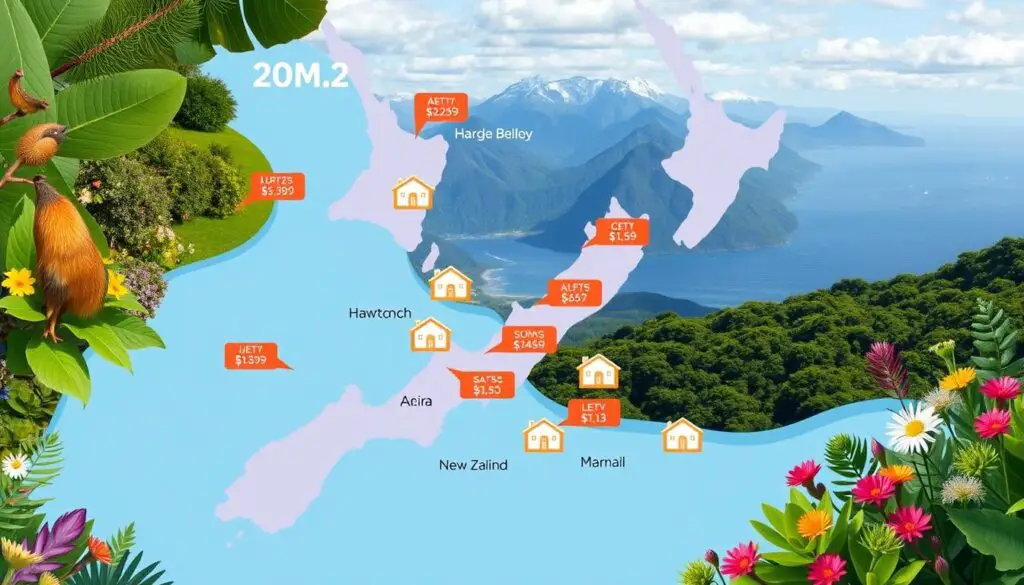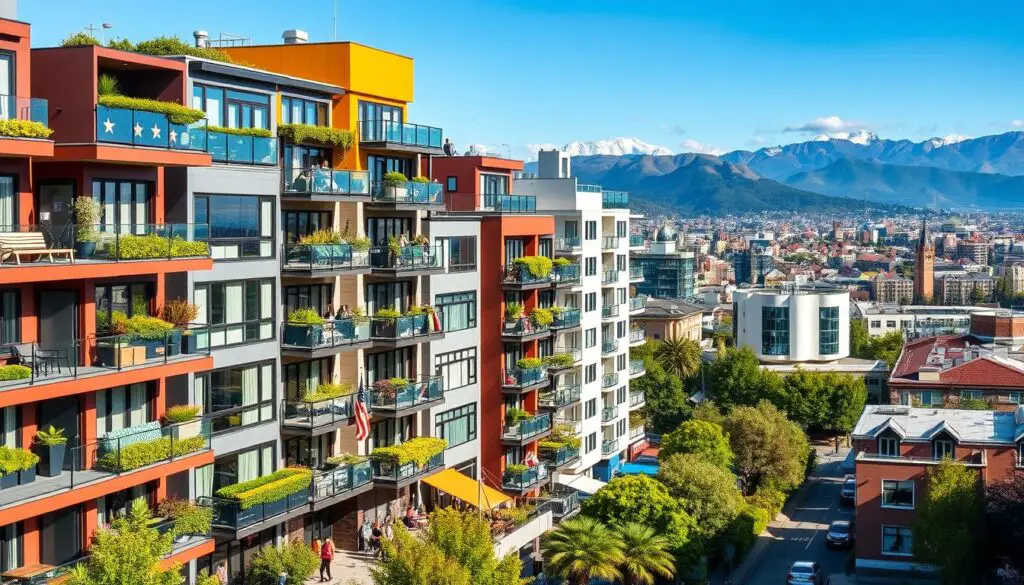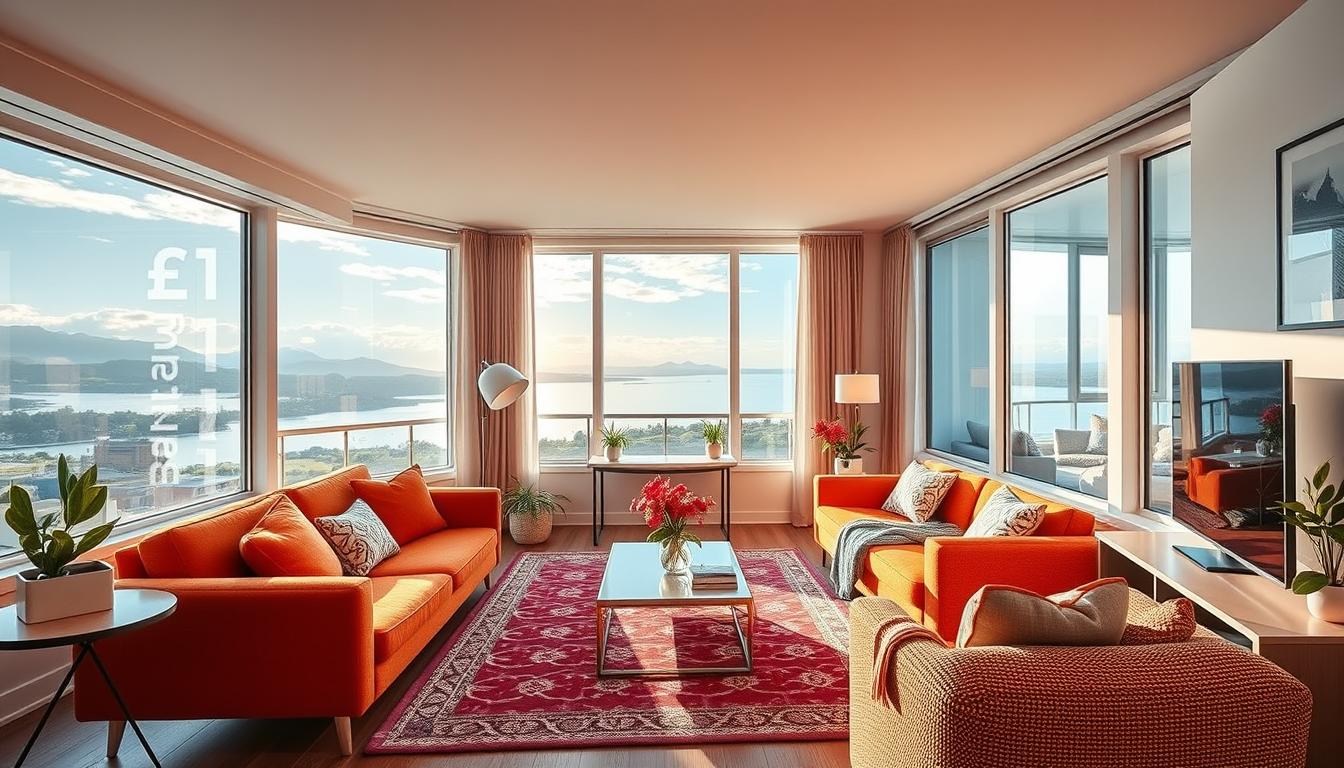Renting a home in New Zealand is a big deal for many. The rent can change a lot based on where you are, how big the place is, and what it has. Knowing what rent costs in New Zealand is key for anyone thinking of moving or changing homes.
This article will explore the New Zealand rental market in detail. We’ll look at the current trends, how location affects prices, and how seasons can change costs. By the end, you’ll know about typical rents in big cities and what else can add to your rent costs.
Key Takeaways
- The cost of rent in New Zealand can vary significantly depending on the location, property size, and amenities.
- Rental prices are influenced by factors such as economic conditions, population growth, and government policies.
- Seasonal variations can also impact the rental market, with peak seasons often seeing higher prices.
- Seasonal variations can also impact the rental market, with peak seasons often seeing higher prices.
- Renters should be aware of additional expenses, such as utilities and fees, when budgeting for their housing costs.
- Understanding the rental landscape in New Zealand can help individuals and families make informed decisions when searching for their next home.
Overview of New Zealand’s Rental Market
New Zealand’s rental market is always changing. It shows the country’s lively housing trends and how location affects prices. With more people moving here, finding affordable places to rent is key.
Current Market Trends and Dynamics
The rental market in New Zealand has seen a big increase in recent years. More people are looking for places to rent, and prices are going up. This is due to the economy growing, more people moving here, and a lack of affordable homes in big cities.
Impact of Location on Rental Prices
Where you are in New Zealand affects how much you pay to rent. The biggest cities like Auckland, Wellington, and Christchurch have the highest prices. This is because they are expensive to live in and very sought after. But, if you live in the countryside, you might find cheaper places to rent, even though there might be fewer options.
Seasonal Variations in Rental Costs
Rental prices in New Zealand change with the seasons. Prices usually go up in summer because more people are looking for places to live. This includes students, tourists, and new arrivals. In winter, prices might drop because fewer people are looking for rentals.
Knowing about the trends, location impact, and seasonal changes helps both renters and investors. It lets them make better choices and understand the housing market better.
Average Rental Prices in Major Cities
Exploring rental prices in New Zealand’s major cities is key. Each city, like Auckland, Wellington, and Christchurch, has its own rental trends. These trends vary greatly.
In Auckland, the largest city, a one-bedroom apartment costs about $450 per week. A three-bedroom home is around $650 per week. Wellington has slightly lower prices, with one-bedrooms at $400 and three-bedroom homes at $550 per week.
Christchurch, the South Island’s largest city, offers more affordable rentals. A one-bedroom apartment is about $350 per week. A three-bedroom house costs around $500 per week.
| City | 1-Bedroom Apartment | 3-Bedroom House |
|---|---|---|
| Auckland | $450 per week | $650 per week |
| Wellington | $400 per week | $550 per week |
| Christchurch | $350 per week | $500 per week |
These figures give a basic idea of rental prices in major cities. But, remember, local conditions, property types, and landlord choices can affect actual costs.

How Much Is Rent in New Zealand? A Detailed Breakdown
Finding a place to rent in New Zealand can be tough. Prices change a lot based on the type of property. We’ll look at the costs for different types of rentals, like studio and one-bedroom apartments, family homes, and luxury properties.
Studio and One-Bedroom Apartments
Studio and one-bedroom apartments are great for those who want a smaller space. Rent for these usually falls between $300 to $800 per week. Prices can go up in big cities like Auckland and Wellington. But, smaller towns might have lower costs.
Family Homes and Multi-Bedroom Units
For families or those needing more room, family homes and multi-bedroom units are good choices. Rent for these can be from $500 to $2,000 per week. The number of bedrooms, location, and size of the home affect the price.
Luxury Rentals and Premium Properties
Luxury rentals offer top comfort and exclusivity. These can cost from $1,000 to $5,000 per week. They often have fancy finishes, private areas, and special facilities.
Rental prices can change with the seasons, with summer being busier. Also, living costs vary across New Zealand. Cities usually have higher prices than rural areas.

“Renting in New Zealand is a dynamic and diverse market, offering something for every budget and lifestyle. By understanding the typical price ranges for different property types, renters can make more informed decisions and find the perfect home to suit their needs.”
Additional Costs and Expenses for Renters
When you’re thinking about renting in New Zealand, it’s important to know about extra costs. These can change how much you spend each month. Key costs include utility bills, renter’s insurance, and property maintenance fees.
Utility bills, like electricity, gas, and water, can increase your monthly spending. The cost depends on your home’s size, how much you use, and who you choose to provide it. It’s smart to look around and compare prices to find the best deal for you.
- Electricity bills can range from $50 to $150 per month, depending on the size of your home and your energy consumption.
- Gas bills, if applicable, can range from $30 to $100 per month, depending on your heating and cooking needs.
- Water bills can range from $30 to $80 per month, depending on your usage and the provider.
Renter’s insurance is also something to think about. It protects your stuff from theft, damage, or disasters. The cost varies from $10 to $30 a month, based on what you want covered and your deductible.
Property maintenance fees, like for lawn care or snow removal, might be part of your rent. These costs can vary a lot. They depend on your home’s size, location, and what services are included. Always talk about these fees with your landlord and include them in your budget.
By knowing and planning for these extra costs, you can make a smart choice when renting in New Zealand. This way, your rental experience will be financially manageable.
Factors Affecting Rental Prices in New Zealand
The rental market in New Zealand is shaped by many factors. These include economic, demographic, and regulatory elements. It’s crucial for both tenants and landlords to understand these to navigate the housing market.
Economic Influences
New Zealand’s economy greatly affects rental prices. Things like GDP growth, employment rates, and consumer confidence matter. They influence demand for rentals and what landlords and tenants can afford.
Population Growth and Housing Demand
New Zealand’s population is growing steadily. This growth, from natural increases and migration, strains the housing supply. It leads to higher competition and rental prices, especially in cities like Auckland and Wellington.
Government Policies and Regulations
The government’s policies and rules on rentals are key. They include rent control, tenancy laws, and housing development plans. These can greatly impact rental prices and make housing more affordable.
FAQ
How much is the average rent in New Zealand?
Rent in New Zealand varies a lot. It depends on where you are, the size of the property, and its type. In big cities like Auckland, Wellington, and Christchurch, prices are usually higher. But in smaller towns and rural areas, they are often lower.
What factors affect rental prices in New Zealand?
Many things affect rental prices in New Zealand. These include the local housing market, population growth, and the economy. Government policies and seasonal changes also play a part. The demand for rentals and the availability of housing are especially important.
How do rental prices differ across New Zealand’s major cities?
Rental prices vary a lot between New Zealand’s big cities. Auckland has the highest average rents, followed by Wellington and Christchurch. The job market, transportation, and how desirable a city is all affect these prices.
What types of rental properties are available in New Zealand?
New Zealand has many types of rental properties. You can find studio and one-bedroom apartments, family homes, and even luxury rentals. The cost depends on the property’s size, location, and what it offers.
What additional costs should renters in New Zealand expect?
Renters in New Zealand should also plan for extra costs. These include utility bills, renter’s insurance, and fees for property maintenance. These costs can change based on the rental agreement and the property itself.
How have government policies and regulations impacted rental prices in New Zealand?
Government policies and regulations have shaped the rental market in New Zealand. Laws about zoning, housing supply, and taxes can affect how many rentals are available and their prices. This, in turn, impacts the overall cost of renting.



